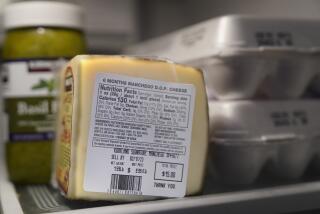When food is sold twice
- Share via
If you leave a bag of groceries behind at the supermarket, who gets the food?
It’s not an inconsequential question. Supermarket operators say perishable and non-perishable items are left behind every week in customers’ rush to load up carts and leave stores. That food is typically put back on shelves and resold unless the customer returns, receipt in hand, to claim it.
If no one turns up, supermarkets can — and often do — sell the same items twice, doubling their profit.
Is that appropriate? Or would it make more sense for the store to acknowledge that it no longer owns the food and to instead donate it to charity?
“It’s surprising no one’s ever asked that before,” said Michael Flood, president of the Los Angeles Regional Food Bank, which distributes 1 million pounds of donated commodities each week, the equivalent of about 770,000 meals. “In all the time I’ve been doing this, it’s never come up.”
Art Fein, 66, of Hollywood did his shopping recently at a Ralphs supermarket near the corner of Hollywood Boulevard and Western Avenue. It wasn’t until he got home that he realized he had left a bag at the cash register. Fein told me he called the store and explained the situation.
“They said this happens all the time,” he recalled. “They told me that the groceries had been put back in stock, but if I came back with my receipt, I could reclaim them.”
Fein did so, but the experience left him thinking.
“Why did they put my groceries back in stock?” he asked. “At this point, they’re mine, not Ralphs’. If they spoil or go bad, that’s my business.”
Fein also wondered why the store didn’t make an effort to contact him. He’s a Ralphs Club member, which means every time he buys something, he swipes his card, recording both the purchase and his identity.
“Ralphs has my phone number,” Fein said. “With just a little effort, they could figure out whose bag of groceries this was and give me a call. But they didn’t do that.”
It’s a fair point, I suppose, but it depends on store workers being able to connect the groceries to a specific customer and having the wherewithal to produce a name and number. That may be asking a bit much of any supermarket employee.
Kendra Doyel, a Ralphs spokeswoman, said the chain doesn’t keep track of how often groceries are left behind, so she couldn’t offer specific details.
“It might happen more in some stores than others,” she said. “It isn’t very common, but it does happen.”
Forgotten grocery bags are typically placed in a cooler for several days awaiting a customer’s call to reclaim them, Doyel said. If no such call comes in, she said, the groceries are put back on sale.
Lilia Rodriguez, a spokeswoman for Albertsons, said groceries are left behind about once a week at self-check-out lanes and every couple of weeks at regular check-out lanes. “If the bag goes unclaimed, the items are restocked,” she said.
Representatives of Vons and Whole Foods said the same. No one at Trader Joe’s returned my calls.
Is the reselling of already-purchased goods legal? Tim Iglesias, a property law specialist at the University of San Francisco School of Law, said that if something is considered abandoned by its former owner, the finder can do whatever he or she likes with it.
If an item is considered misplaced or forgotten, he said, the finder must set it aside for “a reasonable amount of time” to give the owner ample opportunity to reclaim it.
“If it doesn’t get reclaimed,” Iglesias said, “whoever found it gets to do whatever they want with it.”
I asked Doyel, the Ralphs spokeswoman, whether it was double-dipping for the store to resell items that had been paid for once already. What about donating such goods to charity instead?
“I suppose we could,” Doyel replied. “That begs some thought.”
It does. Supermarkets and their distributors already deserve praise for donating significant amounts of damaged goods, such as dented cans, and expiring foods, such as bread, to nonprofit organizations that feed the hungry.
The L.A. Regional Food Bank estimates that donations from supermarkets account for about a third of all food-industry donations annually.
For that reason, the food bank’s Flood said he was reluctant to criticize supermarkets for restocking left-behind groceries, though he said that if stores did decide to donate such items as well, “we would definitely take it.”
All store representatives I spoke with said they do their best to ensure that if someone leaves groceries behind, it’s easy to reclaim them. And that’s fine.
But there are apparently more than a few occasions when, for whatever reason, the shopper decides going back for an errant grocery bag isn’t worth the time or hassle. When that happens, it’s hard to see how ownership of the groceries automatically reverts to the store.
I’m certainly not aware of any stores that publicly post such a policy.
It may be legal to resell left-behind groceries, but it strikes me as an entirely self-serving act. A supermarket in such cases is given the opportunity to either pad its own pockets or do some good for society.
To me, at least, the choice seems clear.
David Lazarus’ column runs Tuesdays and Fridays. He also can be seen daily on KTLA-TV Channel 5 and followed on Twitter @LATlazarus. Send tips or feedback to david.lazarus@latimes.com
More to Read
Inside the business of entertainment
The Wide Shot brings you news, analysis and insights on everything from streaming wars to production — and what it all means for the future.
You may occasionally receive promotional content from the Los Angeles Times.











